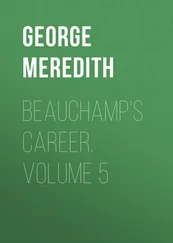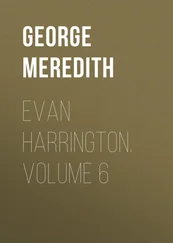George Meredith - Sandra Belloni. Volume 7
Здесь есть возможность читать онлайн «George Meredith - Sandra Belloni. Volume 7» — ознакомительный отрывок электронной книги совершенно бесплатно, а после прочтения отрывка купить полную версию. В некоторых случаях можно слушать аудио, скачать через торрент в формате fb2 и присутствует краткое содержание. Жанр: foreign_prose, literature_19, foreign_antique, на английском языке. Описание произведения, (предисловие) а так же отзывы посетителей доступны на портале библиотеки ЛибКат.
- Название:Sandra Belloni. Volume 7
- Автор:
- Жанр:
- Год:неизвестен
- ISBN:нет данных
- Рейтинг книги:4 / 5. Голосов: 1
-
Избранное:Добавить в избранное
- Отзывы:
-
Ваша оценка:
- 80
- 1
- 2
- 3
- 4
- 5
Sandra Belloni. Volume 7: краткое содержание, описание и аннотация
Предлагаем к чтению аннотацию, описание, краткое содержание или предисловие (зависит от того, что написал сам автор книги «Sandra Belloni. Volume 7»). Если вы не нашли необходимую информацию о книге — напишите в комментариях, мы постараемся отыскать её.
Sandra Belloni. Volume 7 — читать онлайн ознакомительный отрывок
Ниже представлен текст книги, разбитый по страницам. Система сохранения места последней прочитанной страницы, позволяет с удобством читать онлайн бесплатно книгу «Sandra Belloni. Volume 7», без необходимости каждый раз заново искать на чём Вы остановились. Поставьте закладку, и сможете в любой момент перейти на страницу, на которой закончили чтение.
Интервал:
Закладка:
George Meredith
Sandra Belloni – Volume 7
CHAPTER L
Emilia remained locked up with her mother all that evening. The good little shrill woman, tender-eyed and slatternly, had to help try on dresses, and run about for pins, and express her critical taste in undertones, believing all the while that her daughter had given up music to go mad with vanity. The reflection struck her, notwithstanding, that it was a wiser thing for one of her sex to make friends among rich people than to marry a foreign husband.
The girl looked a brilliant woman in a superb Venetian dress of purple velvet, which she called 'the Branciani dress,' and once attired in it, and the rich purges and swelling creases over the shoulders puffed out to her satisfaction, and the run of yellow braid about it properly inspected and flattened, she would not return to her more homely wear, though very soon her mother began to whimper and say that she had lost her so long, and now that she had found her it hardly seemed the same child. Emilia would listen to no entreaties to put away her sumptuous robe. She silenced her mother with a stamp of her foot, and then sighed: "Ah! Why do I always feel such a tyrant with you?" kissing her.
"This dress," she said, and held up her mother's chin fondlingly between her two hands, "this dress was designed by my friend Merthyr—that is, Mr. Powys—from what he remembered of a dress worn by Countess Branciani, of Venice. He had it made to give to me. It came from Paris. Countess Branciani was one of his dearest friends. I feel that I am twice as much his friend with this on me. Mother, it seems like a deep blush all over me. I feel as if I looked out of a rose."
She spread her hands to express the flower magnified.
"Oh! what silly talk," said her mother: "it does turn your head, this dress does!"
"I wish it would give me my voice, mother. My father has no hope. I wish he would send me news to make me happy about him; or come and run his finger up the strings for hours, as he used to. I have fancied I heard him at times, and I had a longing to follow the notes, and felt sure of my semi-tones. He won't see me! Mother! he would think something of me if he saw me now!"
Her mother's lamentations reached that vocal pitch at last which Emilia could not endure, and the little lady was despatched to her home under charge of a servant.
Emilia feasted on the looking-glass when alone. Had Merthyr, in restoring her to health, given her an overdose of the poison?
"Countess Branciani made the Austrian Governor her slave," she uttered, planting one foot upon a stool to lend herself height. "He told her who were suspected, and who would be imprisoned, and gave her all the State secrets. Beauty can do more than music. I wonder whether Merthyr loved her? He loves me!"
Emilia was smitten with a fear that he would speak of it when she next saw him. "Oh! I hope he will be just the same as he has been," she sighed; and with much melancholy shook her head at her fair reflection, and began to undress. It had not struck her with surprise that two men should be loving her, until, standing away from the purple folds, she seemed to grow smaller and smaller, as a fire-log robbed of its flame, and felt insufficient and weak. This was a new sensation. She depended no more on her own vital sincerity. It was in her nature, doubtless, to crave constantly for approval, but in the service of personal beauty instead of divine Art, she found herself utterly unwound without it: victim of a sense of most uncomfortable hollowness. She was glad to extinguish the candle and be covered up dark in the circle of her warmth. Then her young blood sang to her again.
An hour before breakfast every morning she read with Merthyr. Now, this morning how was she to appear to him? There would be no reading, of course. How could he think of teaching one to whom he trembled. Emilia trusted that she might see no change in him, and, above all, that he would not speak of his love for her. Nevertheless, she put on her robe of conquest, having first rejected with distaste a plainer garb. She went down the stairs slowly. Merthyr was in the library awaiting her. "You are late," he said, eyeing the dress as a thing apart from her, and remarking that it was hardly suited for morning wear. "Yellow, if you must have a strong colour, and you wouldn't exhibit the schwartz-gelb of the Tedeschi willingly. But now!"
This was the signal for the reading to commence.
"Wilfrid would not have been so cold to me," thought Emilia, turning the leaves of Ariosto as a book of ashes. Not a word of love appeared to be in his mind. This she did not regret; but she thirsted for the assuring look. His eyes were quietly friendly. So friendly was he, that he blamed her for inattention, and took her once to task about a melodious accent in which she vulgarized the vowels. All the flattery of the Branciani dress could not keep Emilia from her feeling of smallness. Was it possible that he loved her? She watched him as eagerly as her shyness would permit. Any shadow of a change was spied for. Getting no softness from him, or superadded kindness, no shadow of a change in that direction, she stumbled in her reading purposely, to draw down rebuke; her construing was villanously bad. He told her so, and she replied: "I don't like poetry." But seeing him exchange Ariosto for Roman History, she murmured, "I like Dante." Merthyr plunged her remorselessly into the second Punic war.
But there was worse to follow. She was informed that after breakfast she would be called upon to repeat the principal facts she had been reading of. Emilia groaned audibly.
"Take the book," said Merthyr.
"It's so heavy," she complained.
"Heavy?"
"I mean, to carry about."
"If you want to 'carry it about,' the boy shall follow you with it."
She understood that she was being laughed at. Languor, coupled with the consciousness of ridicule, overwhelmed her.
"I feel I can't learn," she said.
"Feel, that you must," was replied to her.
"No; don't take any more trouble with me!"
"Yes; I expect you to distinguish Scipio from Cicero, and not make the mistake of the other evening, when you were talking to Mrs. Cameron."
Emilia left him, abashed, to dread shrewdly their meeting within five minutes at the breakfast-table; to dread eating under his eyes, with doubts of the character of her acts generally. She was, indeed, his humble scholar, though she seemed so full of weariness and revolt. He, however, when alone, looked fixedly at the door through which she had passed, and said, "She loves that man still. Similar ages, similar tastes, I suppose! She is dressed to be ready for him. She can't learn: she can do nothing. My work mayn't be lost, but it's lost for me."
Merthyr did not know that Georgiana had betrayed him, but in no case would he have given Emilia the signs she expected: in the first place, because he had self-command; and, secondly, because of those years he counted in advance of her. So she had the full mystery of his loving her to think over, without a spot of the weakness to fasten on.
Georgiana's first sight of Emilia in her Branciani dress shut her heart against the girl with iron clasps. She took occasion to remark, "We need not expect visitors so very early;" but the offender was impervious. Breakfast finished, the reading with Merthyr recommenced, when Emilia, having got over her surprise at the sameness of things this day, acquitted herself better, and even declaimed the verses musically. Seeing him look pleased, she spoke them out sonorously. Merthyr applauded. Upon which Emilia said, with odd abruptness and solemnity, "Will he come to-day?" It was beyond Merthyr's power of self-control to consent to be taken into a consultation on this matter, and he attempted to put it aside. "He may or he may not—probably to-morrow."
Читать дальшеИнтервал:
Закладка:
Похожие книги на «Sandra Belloni. Volume 7»
Представляем Вашему вниманию похожие книги на «Sandra Belloni. Volume 7» списком для выбора. Мы отобрали схожую по названию и смыслу литературу в надежде предоставить читателям больше вариантов отыскать новые, интересные, ещё непрочитанные произведения.
Обсуждение, отзывы о книге «Sandra Belloni. Volume 7» и просто собственные мнения читателей. Оставьте ваши комментарии, напишите, что Вы думаете о произведении, его смысле или главных героях. Укажите что конкретно понравилось, а что нет, и почему Вы так считаете.












